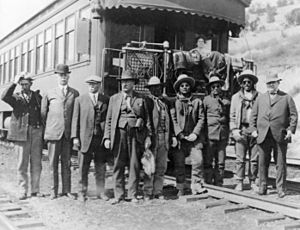Bluff War facts for kids
Quick facts for kids Bluff War |
|||||||
|---|---|---|---|---|---|---|---|
| Part of the Ute Wars, Navajo Wars | |||||||
 People involved in the Bluff War in Thompson, Utah, waiting for a train to go to a trial in Salt Lake City. From left to right: Lorenzo Creel, Colonel Michie, General Scott, Marshal Nebeker, Old Polk, Jeff Posey, Chief Posey, Tse-ne-gat, A.B. Apperson. The Native Americans are wearing dark glasses they were given. |
|||||||
|
|||||||
| Belligerents | |||||||
| Ute Paiute |
|||||||
| Commanders and leaders | |||||||
| Polk Posey |
|||||||
| Casualties and losses | |||||||
| ~2 killed ~5 wounded |
~2 killed ~2 wounded ~160 captured |
||||||
| Civilian Casualties 2 killed | |||||||
The Bluff War was one of the last armed conflicts in Utah. It happened between the United States and Ute and Paiute Native Americans. This conflict is also known as the Posey War of 1915 or the Polk and Posse War.
The trouble began in March 1914. Several Ute people accused Tse-ne-gat, also called Everett Hatch, of a serious crime. Tse-ne-gat was the son of a Paiute Chief named Narraguinnep, also known as "Polk."
In February 1915, a group of people tried to arrest Tse-ne-gat. But the Paiute and Ute groups, led by Chief Polk and Chief Posey, resisted. During this resistance, some people on both sides were hurt or killed. The conflict took place near the town of Bluff, Utah.
In March 1915, leaders talked things over. Chief Polk agreed to hand over Tse-ne-gat to U.S. Army General Hugh L. Scott. Tse-ne-gat went to trial in Denver in July 1915. The court found him innocent of the crime.
What Happened Next
Tse-ne-gat passed away at age 39, eleven years after his trial. The Ute and Paiute chiefs, Polk and Posey, had promised to live on the Ute Reservation in Colorado. However, they were not welcome there and had no way to get food.
Because of this, they soon returned to their old way of life, moving from place to place. They survived by getting help from people in southeastern Utah. They also got food by taking cattle. The tensions between settlers and Native Americans continued. This eventually led to another conflict in 1923, known as the Posey War.
 | Madam C. J. Walker |
 | Janet Emerson Bashen |
 | Annie Turnbo Malone |
 | Maggie L. Walker |


